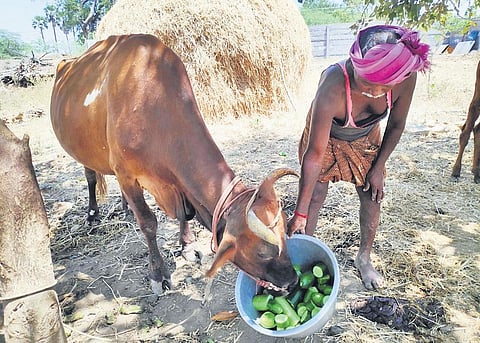

CHENNAI: To compensate for shrinking grazing land and other common areas in villages, the department of animal husbandry and veterinary sciences has decided to cultivate high-yielding fodder on meikkal land (grazing poramboke land) and sell it to self-help groups and farmers at a subsidised rate of Rs 4 per kg. The market price of fodder is Rs 12 - Rs 14 per kg.
A total of 3,500 tonnes of fodder is planned to be produced on 25 acres over the next three years. At least five acres of common grazing land will be selected in each of five districts - Coimbatore, Cuddalore, Tiruvannamalai, Villupuram and Salem – according to a government order dated November 6, issued by Mangat Ram Sharma, secretary, animal husbandry and veterinary sciences.
The G.O. further states that `2.33 crore has been released for creating infrastructure to cultivate fodder in 25 acres across the five districts, with each district receiving Rs 46.26 lakh. Through the initiative, the availability of high-yielding fodder varieties in the market is expected to be enhanced, thereby reducing the input cost of cattle farming, said an official.
SHGs will be encouraged to cultivate high-biomass-yielding crop - cumbu Napier hybrid on selected five acres of meikkal land. The fodder will be utilized by SHG members and the excess will be distributed to local needy farmers at a reasonable rate. The revenue from the sale of fodder is expected to be around `84 lakh.
SHGs that are active and involved in agricultural activities and willing to cultivate fodder will be selected with the support of project director of Mahalir Thittam/ State Rural Livelihood Mission. “Many grazing land have become degraded due to heavy biotic pressure, especially overgrazing over the years. The occupation of large extents of grazing land by invasive alien plant species also affects their productivity,” said the order.